| Srl | Item |
| 1 |
ID:
044721
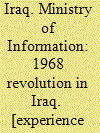

|
|
|
|
|
| Publication |
London, Ithaca press, 1979.
|
| Description |
176p.hbk
|
| Standard Number |
0903729458
|
|
|
|
|
|
|
|
|
|
|
|
Copies: C:1/I:0,R:0,Q:0
Circulation
| Accession# | Call# | Current Location | Status | Policy | Location |
| 018956 | 956.7043/IRA 018956 | Main | On Shelf | General | |
|
|
|
|
| 2 |
ID:
030920


|
|
|
|
|
| Publication |
London, Lawrence and Wishart, 1963.
|
| Description |
174p.hbk
|
|
|
|
|
|
|
|
|
|
|
|
Copies: C:1/I:0,R:0,Q:0
Circulation
| Accession# | Call# | Current Location | Status | Policy | Location |
| 001770 | 960/WOD 001770 | Main | On Shelf | General | |
|
|
|
|
| 3 |
ID:
099529
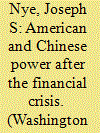

|
|
|
| 4 |
ID:
048113
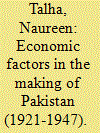

|
|
|
|
|
| Edition |
1st ed.
|
| Publication |
Oxford, Oxford University Press, 2000.
|
| Description |
x, 220p.hbk
|
| Standard Number |
0195791843
|
|
|
|
|
|
|
|
|
|
|
|
Copies: C:2/I:0,R:0,Q:0
Circulation
| Accession# | Call# | Current Location | Status | Policy | Location |
| 042523 | 954.91/TAL 042523 | Main | On Shelf | General | |
| 043920 | 954.91/TAL 043920 | Main | On Shelf | General | |
|
|
|
|
| 5 |
ID:
193776


|
|
|
|
|
| Summary/Abstract |
This study estimates the economic independence (EI) of older Chinese women with agricultural hukou and examines the relationship between their EI and living arrangements. Using the concept of happiness, the study explains the driving forces of the relationship between these women's EI and living arrangements and summarizes the effects of husbands, children, and grandchildren in terms of the economic substitution effect, economic gravitational effect, and non-economic gravitational effect. Older women's EI is very low, and their average pension income is only 21% of the local average consumption. There is a negative relationship between their EI and the probability of living with their children. Older women with no financial constraints are more likely to live on their own or apart from their children. Happiness drops significantly when older women live with their lower-income children. The substitution effect of a husband's income not only reduces the overall probability of the female elderly living with their children but also reduces the marginal effect of the female elderly's EI on that probability. When older women have low personal EI or poor health, and their children have high incomes, they tend to live with their relatively higher-income children. Grandchildren aged 0–5 generally increase the probability of elderly women living with their children. Common prosperity in China requires enhancing the developmental capacity of all people. Improving the happiness and life quality of the rural female elderly must be approached from two perspectives: from the perspective of the elderly, to increase pension income and improve the actual effect of the social pension service; and from the perspective of children, to ensure their stable employment and income growth and reduce their child-care burdens (both financial and caring) in various ways.
|
|
|
|
|
|
|
|
|
|
|
|
|
|
|
|
| 6 |
ID:
126169


|
|
|
|
|
| Publication |
2013.
|
| Summary/Abstract |
Charting the rise and fall of the Grow More Food programme in India, this article explores a set of tensions that characterised development policies in the first decade after Independence in India. The post-colonial Indian state staked its legitimacy on securing economic independence for India, and, in particular, on being able to feed its citizens without resorting to importing food. The transition to food independence, however, was fraught and contested. In particular, this piece argues, the plans to get the nation to 'Grow More Food' as part of this drive towards national self-sufficiency were marked by a conflict between the dream of providing the benefits of development to all Indians and the reality that independent India's resources were extremely limited. In addition, this transition also involved a transformation in the nature of nationalism. The ruling Indian National Congress struggled to formulate a post-colonial nationalism because it was torn between using the state for development and urging the people to shape their own destiny outside of the state. It was also deeply ambivalent about rural citizens, who were viewed both as a burden and as a potentially limitless public resource. This article suggests that one of the defining features of post-colonial development was the tension between scientific and democratic development.
|
|
|
|
|
|
|
|
|
|
|
|
|
|
|
|
| 7 |
ID:
098385
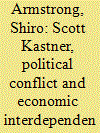

|
|
|
| 8 |
ID:
085334
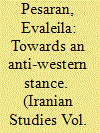

|
|
|
|
|
| Publication |
2008.
|
| Summary/Abstract |
The Iranian Revolution of 1979 saw the mobilization and cooperation of a variety of groupings that were brought together by their shared determination to overthrow the Shah. However, it was not only opposition to the Pahlavi regime, but also suspicion of and disdain for that regime's Western backers that united these revolutionary groups. Religious leaders (ulama), merchants (bazaaris), intellectuals and students alike all espoused the strong anti-Western sentiments that had been developing in Iran over the previous two decades. But what particular factors can be seen to have encouraged the adoption of these sentiments in the lead-up to the revolution, and in what ways were they articulated and subsequently put into practice by the leaders of the new regime? This article suggests that various domestic and international influences can be seen to have shaped the emergence of Iran's revolutionary discourse of "economic independence." In particular, the paper argues that a peculiar blend of Shi'i concepts of social justice and Marxist-Leninist discourses of class struggle and anti-imperialism not only informed the economic outlook of Iran's burgeoning revolutionary movement during the period 1953-79, but was also enshrined in the Constitution of the Islamic Republic.
|
|
|
|
|
|
|
|
|
|
|
|
|
|
|
|